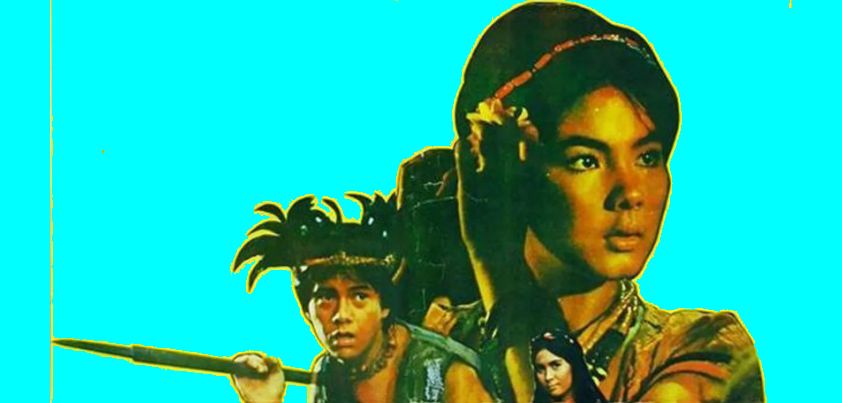 In this novelette by Francisco Sionil José, a tragic love story between members of two rival, pre-colonial Filipino tribes highlights major themes of identity and personal freedom, the opportunity cost of cultural hostilities, and how corrupt rulers can entrench their position by encouraging fear of an enemy. The story begins on an ironic note, with a young warrior who yearns for the freedom to determine his own destiny, impulsively kidnapping and enslaving a girl from the other tribe. The girl, whose name “Waywaya” translates as “freedom”, is cruelly robbed of hers. Other themes include social injustice, jealousy, prejudice, and sacrifice. More…
In this novelette by Francisco Sionil José, a tragic love story between members of two rival, pre-colonial Filipino tribes highlights major themes of identity and personal freedom, the opportunity cost of cultural hostilities, and how corrupt rulers can entrench their position by encouraging fear of an enemy. The story begins on an ironic note, with a young warrior who yearns for the freedom to determine his own destiny, impulsively kidnapping and enslaving a girl from the other tribe. The girl, whose name “Waywaya” translates as “freedom”, is cruelly robbed of hers. Other themes include social injustice, jealousy, prejudice, and sacrifice. More…
Category Archives: Novelettes
Il Colore Ritrovato
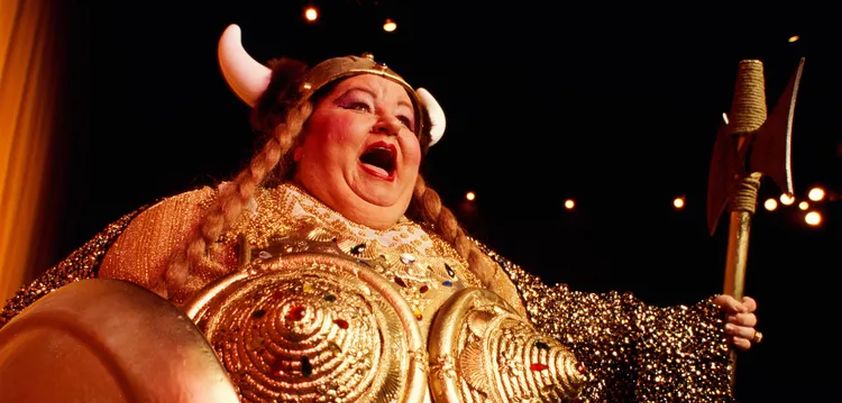 This story by Mark Helprin explores the theme “the price of fame”. An ageing impresario reflects on how he transformed a contented young laundry worker into the greatest opera singer in the world. He has just come across an innocent young street performer who could be even better, and faces a dilemma. Although his first discovery has found fame and fortune, he is unhappy about how it affected her. Should he immediately launch his excited new find into stardom, or insist that she takes time to consider the consequences? Other themes include entrepreneurship, responsibility, regret, compassion, redemption, art and beauty. More…
This story by Mark Helprin explores the theme “the price of fame”. An ageing impresario reflects on how he transformed a contented young laundry worker into the greatest opera singer in the world. He has just come across an innocent young street performer who could be even better, and faces a dilemma. Although his first discovery has found fame and fortune, he is unhappy about how it affected her. Should he immediately launch his excited new find into stardom, or insist that she takes time to consider the consequences? Other themes include entrepreneurship, responsibility, regret, compassion, redemption, art and beauty. More…
Good Country People
 In this story by Flannery O’Connor a condescending, highly educated woman who lost a leg in a childhood accident learns a potentially life-changing lesson when she tries to seduce a young bible salesman claiming to have come from a good country family. A message of the story is the danger of judging people by superficial factors such as where they live, education level and socioeconomic status. Ironically, despite identifying with each other as “Good Country People”, no one in the story displays all the qualities of that description. Themes include identity, faith, stereotyping, hypocrisy, disability, appearance vs. reality, naivety, deception. More…
In this story by Flannery O’Connor a condescending, highly educated woman who lost a leg in a childhood accident learns a potentially life-changing lesson when she tries to seduce a young bible salesman claiming to have come from a good country family. A message of the story is the danger of judging people by superficial factors such as where they live, education level and socioeconomic status. Ironically, despite identifying with each other as “Good Country People”, no one in the story displays all the qualities of that description. Themes include identity, faith, stereotyping, hypocrisy, disability, appearance vs. reality, naivety, deception. More…
Nobody Will Laugh
 In this story by Milan Kundera, a Czechoslovakian college lecturer “rewards” an amateur researcher’s gushing praise by going to great lengths to avoid telling the truth about a substandard paper he has submitted for review. Having spent several years on the paper, the man needs the lecturer’s endorsement to have it published. He refuses to give up, resulting in a comic series of events that culminate in the lecturer not only being charged with immoral conduct by his local communist party committee, but losing his job and the partner he belatedly realizes he loves. Themes include hubris, deception, manipulation, persistence. More…
In this story by Milan Kundera, a Czechoslovakian college lecturer “rewards” an amateur researcher’s gushing praise by going to great lengths to avoid telling the truth about a substandard paper he has submitted for review. Having spent several years on the paper, the man needs the lecturer’s endorsement to have it published. He refuses to give up, resulting in a comic series of events that culminate in the lecturer not only being charged with immoral conduct by his local communist party committee, but losing his job and the partner he belatedly realizes he loves. Themes include hubris, deception, manipulation, persistence. More…
The Horla
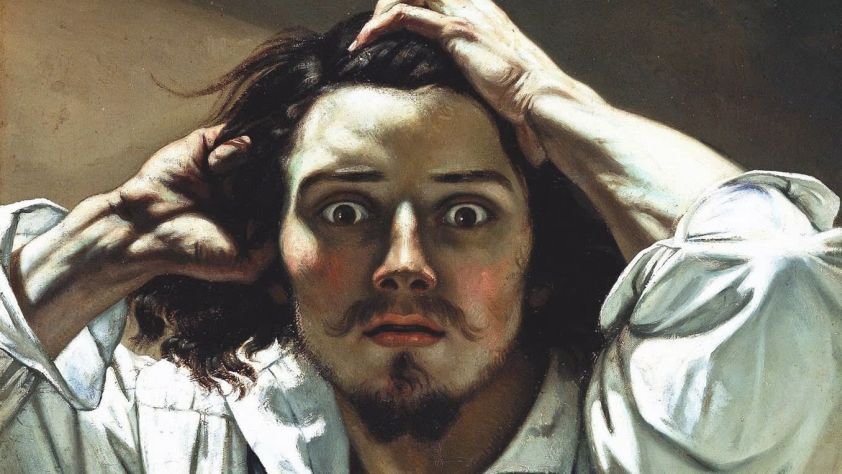 This story by Guy de Moupassant describes a man’s slow descent into madness, convinced that an invisible being he unknowingly lured from a passing ship is preying on his mind. As the entity (supposedly an otherworldly species of vampire that feeds on the life force of those it attaches to) gets stronger, he begins to lose his free will. Unable to flee, he traps it in his bedroom and burns his house to the ground. When this doesn’t work, he contemplates an even more extreme solution. Themes include reality vs. illusion, the unknown/supernatural, terror, madness, despair. More…
This story by Guy de Moupassant describes a man’s slow descent into madness, convinced that an invisible being he unknowingly lured from a passing ship is preying on his mind. As the entity (supposedly an otherworldly species of vampire that feeds on the life force of those it attaches to) gets stronger, he begins to lose his free will. Unable to flee, he traps it in his bedroom and burns his house to the ground. When this doesn’t work, he contemplates an even more extreme solution. Themes include reality vs. illusion, the unknown/supernatural, terror, madness, despair. More…
Defender of the Faith
 This story by Philip Roth raises questions about the conflict between integrity and loyalty to one’s community group. A Jewish-American army sergeant returning from the European battlefields towards the end of World War 2 is assigned to a training unit in which there is an entitled Jewish recruit. The recruit exploits their common heritage, scheming, lying and manipulating the sergeant to receive special treatment. When the self-serving recruit goes behind the sergeant’s back to avoid serving in the Pacific, he is quickly put in his place. Themes include identity, integrity, “Jewishness”, antisemitism, manipulation. More…
This story by Philip Roth raises questions about the conflict between integrity and loyalty to one’s community group. A Jewish-American army sergeant returning from the European battlefields towards the end of World War 2 is assigned to a training unit in which there is an entitled Jewish recruit. The recruit exploits their common heritage, scheming, lying and manipulating the sergeant to receive special treatment. When the self-serving recruit goes behind the sergeant’s back to avoid serving in the Pacific, he is quickly put in his place. Themes include identity, integrity, “Jewishness”, antisemitism, manipulation. More…
Night Talkers
 In this story by Edwidge Danticat, a Haitian man living in New York returns to visit the aunt who raised him after his parents were murdered during the “Papa Doc” dictatorship. He believes he may have found their killer in America and wants to learn more about them before deciding to what to do. Sadly, his aunt dies before they can discuss it. At her wake, the story of a fellow “night talker” exemplifies how forgiveness may be a better path than revenge. Themes include violence and loss, memory, family, community, tradition, communication, dreams, guilt, forgiveness vs. vengeance. More…
In this story by Edwidge Danticat, a Haitian man living in New York returns to visit the aunt who raised him after his parents were murdered during the “Papa Doc” dictatorship. He believes he may have found their killer in America and wants to learn more about them before deciding to what to do. Sadly, his aunt dies before they can discuss it. At her wake, the story of a fellow “night talker” exemplifies how forgiveness may be a better path than revenge. Themes include violence and loss, memory, family, community, tradition, communication, dreams, guilt, forgiveness vs. vengeance. More…
Exotic Pleasures
 In this science fiction story by Peter Carey, a poverty-stricken woman waiting as her husband applies for a mining job on a distant planet spends some of their last savings on a brightly coloured exotic bird. The bird has a unique quality… it gives a rush of euphoria followed by continuing pleasure to those who stroke it. The woman develops a lucrative business traveling the country selling time with the bird, little realizing that it has a dark side which will destroy her marriage and cause mass destruction. Themes include poverty, love, entrepreneurship, self-gratification, jealousy, biosecurity risks. More…
In this science fiction story by Peter Carey, a poverty-stricken woman waiting as her husband applies for a mining job on a distant planet spends some of their last savings on a brightly coloured exotic bird. The bird has a unique quality… it gives a rush of euphoria followed by continuing pleasure to those who stroke it. The woman develops a lucrative business traveling the country selling time with the bird, little realizing that it has a dark side which will destroy her marriage and cause mass destruction. Themes include poverty, love, entrepreneurship, self-gratification, jealousy, biosecurity risks. More…
Come Rain or Come Shine
 This story by Kazuo Ishiguro is a farcical satire of a man trying to save his stagnating marriage. He manipulates a mutual friend living overseas into providing company for his wife while he is away on business. The friend has achieved little in life and the husband hopes that the contrast will make his wife appreciate him more. A hilarious sequence of events unfolds as the friend tries to cover up damage he caused to the wife’s appointment book after reading unflattering entries about himself. Themes include friendship, alienation in marriage, manipulation, sacrifice, disappointment, the power of music, memories, regrets. More…
This story by Kazuo Ishiguro is a farcical satire of a man trying to save his stagnating marriage. He manipulates a mutual friend living overseas into providing company for his wife while he is away on business. The friend has achieved little in life and the husband hopes that the contrast will make his wife appreciate him more. A hilarious sequence of events unfolds as the friend tries to cover up damage he caused to the wife’s appointment book after reading unflattering entries about himself. Themes include friendship, alienation in marriage, manipulation, sacrifice, disappointment, the power of music, memories, regrets. More…
Only Goodness
 In this Jhumpa Lahiri story a Bengali-American woman successfully navigates growing up in a strict environment where her parents compensate for their lack of love for one another by high expectations of their children. This is not true of her more academically gifted younger brother, whose alcohol abuse shames her parents in the eyes of the local Bengali diaspora. She feels partly responsible for his drinking and subsequent fall, and makes a foolish decision that destroys her husband’s trust and almost costs the life of their child. Themes include cultural identity, sibling relationships, parental expectations, alcoholism, rebellion, alienation, guilt, trust. More…
In this Jhumpa Lahiri story a Bengali-American woman successfully navigates growing up in a strict environment where her parents compensate for their lack of love for one another by high expectations of their children. This is not true of her more academically gifted younger brother, whose alcohol abuse shames her parents in the eyes of the local Bengali diaspora. She feels partly responsible for his drinking and subsequent fall, and makes a foolish decision that destroys her husband’s trust and almost costs the life of their child. Themes include cultural identity, sibling relationships, parental expectations, alcoholism, rebellion, alienation, guilt, trust. More…
The Higgler
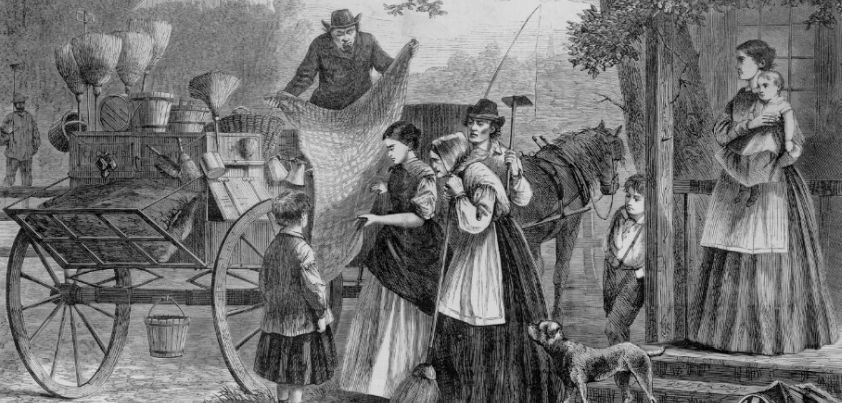 In this story by A. E. Coppard, a higgler (peddler) faces a difficult choice. Although not formally engaged, he has been “keeping company” with a girl everyone expects him to marry. Life gets complicated when one of his suppliers, a wealthy widow in poor health, asks him to marry her beautiful, well-educated daughter. Though strongly attracted to the girl, she has shown little interest in him. He makes his decision thinking the mother’s offer must have a hidden catch. When she dies, he learns something that may have changed his mind. Themes include struggle, choices and consequences, suspicion, unconsummated love. More…
In this story by A. E. Coppard, a higgler (peddler) faces a difficult choice. Although not formally engaged, he has been “keeping company” with a girl everyone expects him to marry. Life gets complicated when one of his suppliers, a wealthy widow in poor health, asks him to marry her beautiful, well-educated daughter. Though strongly attracted to the girl, she has shown little interest in him. He makes his decision thinking the mother’s offer must have a hidden catch. When she dies, he learns something that may have changed his mind. Themes include struggle, choices and consequences, suspicion, unconsummated love. More…
The Shadowy Third
 This psychological ghost story by Ellen Glasgow combines themes of the supernatural, crime (murder) and justice (revenge). A young nurse besotted by a popular doctor is assigned as night-nurse to his ailing wife. The woman, who is recovering from the death of her young daughter from a previous marriage, is suffering “hallucinations” that the girl is still alive. When the nurse claims that she, too, can see the spectral child, the mother confides that her husband killed her. The woman dies soon afterwards and, when the doctor claims her multi-million dollar estate, justice is served in an unexpected manner. More…
This psychological ghost story by Ellen Glasgow combines themes of the supernatural, crime (murder) and justice (revenge). A young nurse besotted by a popular doctor is assigned as night-nurse to his ailing wife. The woman, who is recovering from the death of her young daughter from a previous marriage, is suffering “hallucinations” that the girl is still alive. When the nurse claims that she, too, can see the spectral child, the mother confides that her husband killed her. The woman dies soon afterwards and, when the doctor claims her multi-million dollar estate, justice is served in an unexpected manner. More…
The Heathen
 This Jack London story describes the seventeen-year relationship between a hard-drinking American pearl buyer and an outcast Pacific Islander (Otoo). The only survivors of a ship that sinks in a hurricane, the two form a life-long bond. Otoo becomes the American’s shadow and protector and, thanks to his judicious career and investment advice, the friends become wealthy. While the American enjoys their riches, Otoo refuses to spend them. The story ends tragically, with Otoo making the supreme sacrifice in saving the American’s life. Themes include colonialism and exploitation, the power of nature, racism, friendship, selflessness, courage, sacrifice, secular humanism. More…
This Jack London story describes the seventeen-year relationship between a hard-drinking American pearl buyer and an outcast Pacific Islander (Otoo). The only survivors of a ship that sinks in a hurricane, the two form a life-long bond. Otoo becomes the American’s shadow and protector and, thanks to his judicious career and investment advice, the friends become wealthy. While the American enjoys their riches, Otoo refuses to spend them. The story ends tragically, with Otoo making the supreme sacrifice in saving the American’s life. Themes include colonialism and exploitation, the power of nature, racism, friendship, selflessness, courage, sacrifice, secular humanism. More…
The Country of the Blind
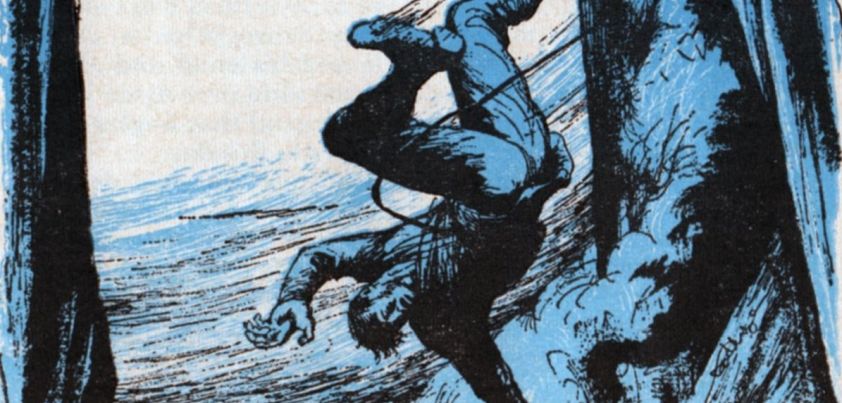 In this story by H. G. Wells, a climber falls thousands of feet off a mountain into soft snow. He survives, to find himself in a hidden valley inhabited by a community who were born blind. Initially, he sees this as an opportunity to assume power in line with the proverb: In the Country of the Blind the One-eyed Man is King. However, things don’t go as planned. He soon finds that rather than being disabling, blindness gives the inhabitants additional capabilities. Themes include isolation, disability, lust for power, delusion/entrenched attitudes (metaphorical blindness), unfulfilled love, sacrifice, liberation. More…
In this story by H. G. Wells, a climber falls thousands of feet off a mountain into soft snow. He survives, to find himself in a hidden valley inhabited by a community who were born blind. Initially, he sees this as an opportunity to assume power in line with the proverb: In the Country of the Blind the One-eyed Man is King. However, things don’t go as planned. He soon finds that rather than being disabling, blindness gives the inhabitants additional capabilities. Themes include isolation, disability, lust for power, delusion/entrenched attitudes (metaphorical blindness), unfulfilled love, sacrifice, liberation. More…
Drinking Coffee Elsewhere
 In this story by ZZ Packer, an African-American woman completing her first year at Yale University struggles with her identity and sexuality. Thanks to a comment during orientation, she is assigned a year of close-watch and psychiatric counselling. When not attending class she lives as a recluse, spurning friendships until linking up with an overweight white girl. The two form a close relationship with moments of sexual tension, until the friend comes out as a lesbian. The protagonist immediately cuts her off, later regretting the decision and wishing they could reunite. Other themes include misanthropy, loneliness, friendship, race, pretense. More…
In this story by ZZ Packer, an African-American woman completing her first year at Yale University struggles with her identity and sexuality. Thanks to a comment during orientation, she is assigned a year of close-watch and psychiatric counselling. When not attending class she lives as a recluse, spurning friendships until linking up with an overweight white girl. The two form a close relationship with moments of sexual tension, until the friend comes out as a lesbian. The protagonist immediately cuts her off, later regretting the decision and wishing they could reunite. Other themes include misanthropy, loneliness, friendship, race, pretense. More…
María Concepción
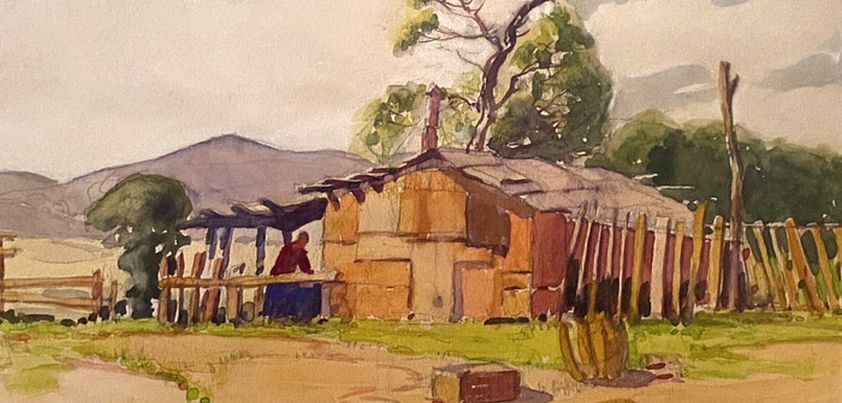 This story by Katherine Anne Porter exemplifies the proverb Hell hath no fury like a woman scorned. María Concepción, a pious Mexican peasant, is shattered when her husband has an affair with a fifteen-year-old neighbour and runs away with her to war. When the two return, the girl heavily pregnant, he expects their marriage to continue as if nothing had happened. Maria makes sure of this by brutally murdering the girl. During the police investigation the community covers up her involvement, perhaps sensing that true justice has been served. Themes include patriarchy, betrayal, revenge, moral vs. legal justice, feminism. More…
This story by Katherine Anne Porter exemplifies the proverb Hell hath no fury like a woman scorned. María Concepción, a pious Mexican peasant, is shattered when her husband has an affair with a fifteen-year-old neighbour and runs away with her to war. When the two return, the girl heavily pregnant, he expects their marriage to continue as if nothing had happened. Maria makes sure of this by brutally murdering the girl. During the police investigation the community covers up her involvement, perhaps sensing that true justice has been served. Themes include patriarchy, betrayal, revenge, moral vs. legal justice, feminism. More…
The Final Problem / Empty House
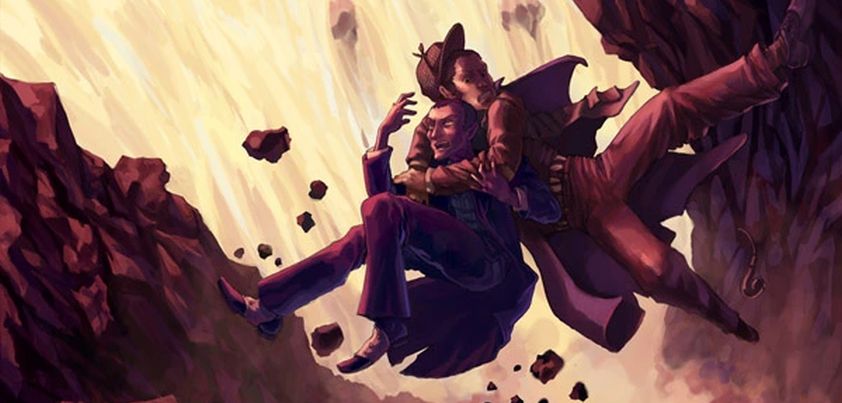 Today we have two stories by Arthur Conan Doyle dealing with the “death” and “rebirth” of Sherlock Holmes. In The Final Problem, Holmes has his first and last encounter with master criminal and his intellectual equal, Professor James Moriarty. After a pursuit across Europe, the pair are believed to have perished when they tumbled off the Reichenbach Falls during a struggle. In the Adventure of the Empty House, Holmes miraculously returns to bring three remaining members of Moriarty’s criminal network to justice. In capturing the first, he solves an important murder investigation. Themes include justice, pursuit, deception, courage, sacrifice, death. More…
Today we have two stories by Arthur Conan Doyle dealing with the “death” and “rebirth” of Sherlock Holmes. In The Final Problem, Holmes has his first and last encounter with master criminal and his intellectual equal, Professor James Moriarty. After a pursuit across Europe, the pair are believed to have perished when they tumbled off the Reichenbach Falls during a struggle. In the Adventure of the Empty House, Holmes miraculously returns to bring three remaining members of Moriarty’s criminal network to justice. In capturing the first, he solves an important murder investigation. Themes include justice, pursuit, deception, courage, sacrifice, death. More…
Don’t Cry
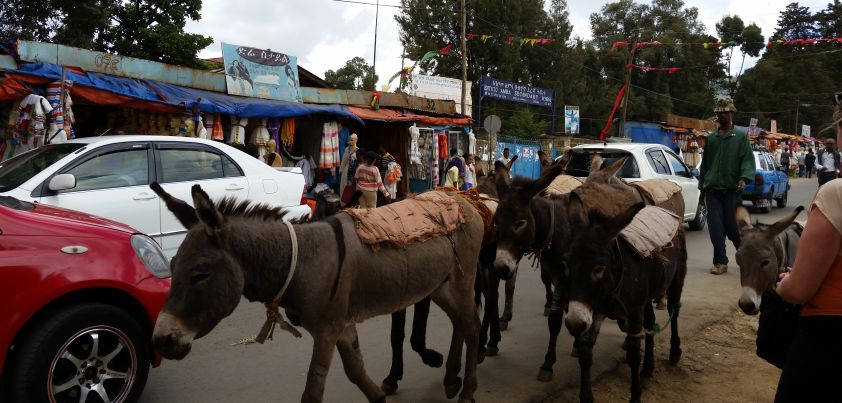 In this moving story by Mary Gaitskill, a grief and guilt stricken woman accompanies a friend to adopt a child in Ethiopia. Because the friend had chosen to adopt independently rather than through an agency, they are initially stonewalled by bureaucrats and find official orphanages closed to them. They gain the necessary approvals after a poverty-stricken mother unselfishly gives up her malnourished two-year-old son, only to find themselves temporarily caught up in a violent civil uprising. The protagonist gains almost as much from the trip as her friend. Themes include love, grief, betrayal, healing, sexuality, determination, poverty, violence. More…
In this moving story by Mary Gaitskill, a grief and guilt stricken woman accompanies a friend to adopt a child in Ethiopia. Because the friend had chosen to adopt independently rather than through an agency, they are initially stonewalled by bureaucrats and find official orphanages closed to them. They gain the necessary approvals after a poverty-stricken mother unselfishly gives up her malnourished two-year-old son, only to find themselves temporarily caught up in a violent civil uprising. The protagonist gains almost as much from the trip as her friend. Themes include love, grief, betrayal, healing, sexuality, determination, poverty, violence. More…
Another Pioneer
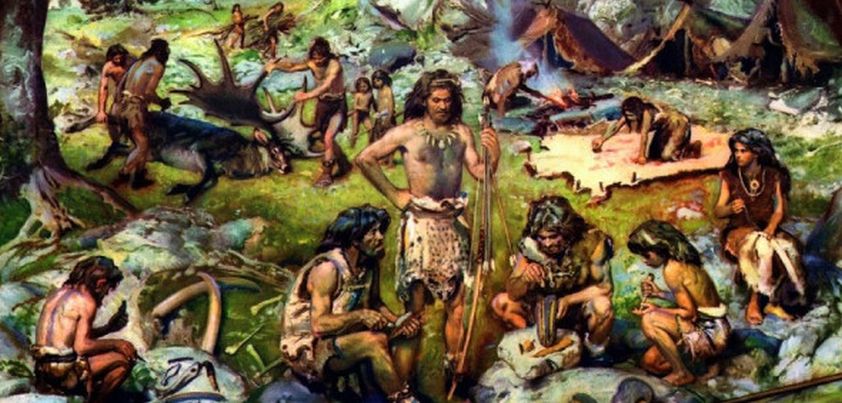 This story by David Foster Wallace comprises a single paragraph of over 9,100 words. A writer shares a tale he heard from a friend. A three-year-old boy in a paleolithic jungle tribe has the seemingly magical ability to correctly answer any question. The tribe prospers with his help, developing quickly from hunter-gatherers to embracing agriculture and animal husbandry. Upon reaching puberty, the boy’s answers become more philosophical, challenging questioners and the tribe’s ancient beliefs. Fear on both sides leads to either his, or the tribe’s destruction. Themes include storytelling, superstition, the destructive power of knowledge, self-consciousness, social class/caste, greed, fear. More…
This story by David Foster Wallace comprises a single paragraph of over 9,100 words. A writer shares a tale he heard from a friend. A three-year-old boy in a paleolithic jungle tribe has the seemingly magical ability to correctly answer any question. The tribe prospers with his help, developing quickly from hunter-gatherers to embracing agriculture and animal husbandry. Upon reaching puberty, the boy’s answers become more philosophical, challenging questioners and the tribe’s ancient beliefs. Fear on both sides leads to either his, or the tribe’s destruction. Themes include storytelling, superstition, the destructive power of knowledge, self-consciousness, social class/caste, greed, fear. More…
Spring in Fialta
 Acclaimed as one of Vladimir Nabokov’s best stories, Spring in Fialta’s is a haunting reminiscence of what was and might have been. A businessman travels widely across Europe. On many occasions, and in different cities, he coincidentally comes across and enjoys brief dalliances with the same enigmatic woman. Both are married and know each other’s partners. He has strong romantic feelings for her, but is unsure if they are reciprocated. A meeting in Fialta, in which he tentatively admits his love, is their last before her tragic death. Themes include memories and the past, fate, love and desire, death, loss. More…
Acclaimed as one of Vladimir Nabokov’s best stories, Spring in Fialta’s is a haunting reminiscence of what was and might have been. A businessman travels widely across Europe. On many occasions, and in different cities, he coincidentally comes across and enjoys brief dalliances with the same enigmatic woman. Both are married and know each other’s partners. He has strong romantic feelings for her, but is unsure if they are reciprocated. A meeting in Fialta, in which he tentatively admits his love, is their last before her tragic death. Themes include memories and the past, fate, love and desire, death, loss. More…
The Rats in the Walls
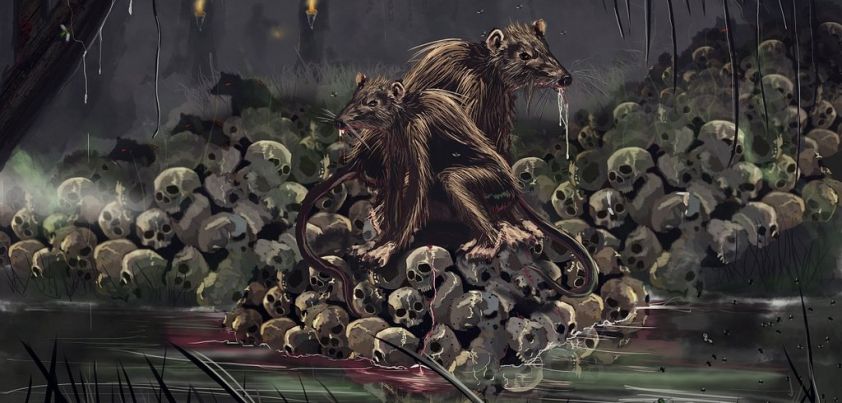 In this story by H. P. Lovecraft, the sound of a swarm of rats in the walls of his recently restored family castle causes the last of a long line of British aristocrats to lead a group of scientists to explore its long-sealed lower chambers. There they find a hidden city and evidence spanning many millennia of the capture and farming of human and quadrupedal sub-human beings for sacrifice and consumption. The excitement is too much for the owner, who quickly reverts to his old family ways. Themes include heritage and identity, genetic madness, paganism, human sacrifice. More…
In this story by H. P. Lovecraft, the sound of a swarm of rats in the walls of his recently restored family castle causes the last of a long line of British aristocrats to lead a group of scientists to explore its long-sealed lower chambers. There they find a hidden city and evidence spanning many millennia of the capture and farming of human and quadrupedal sub-human beings for sacrifice and consumption. The excitement is too much for the owner, who quickly reverts to his old family ways. Themes include heritage and identity, genetic madness, paganism, human sacrifice. More…
Testimony of Pilot
 This powerful story by Barry Hannah follows the journey of a boy and several companions from youthful pranks to high school band competitions, musical success, fulfilling careers and, in two cases, premature death. Set between the mid-1950s and the late-1960s, the story highlights several aspects of the American South’s small-town culture of the day: family wholesomeness, racial segregation, the sexual revolution, the rise of rock and roll, and the Vietnam War. Themes include the transformative power of music, friendship and rivalry, sexuality, gender roles, misogyny, racism, isolation, patriotism, and social change. More…
This powerful story by Barry Hannah follows the journey of a boy and several companions from youthful pranks to high school band competitions, musical success, fulfilling careers and, in two cases, premature death. Set between the mid-1950s and the late-1960s, the story highlights several aspects of the American South’s small-town culture of the day: family wholesomeness, racial segregation, the sexual revolution, the rise of rock and roll, and the Vietnam War. Themes include the transformative power of music, friendship and rivalry, sexuality, gender roles, misogyny, racism, isolation, patriotism, and social change. More…
Flying Home
 In this story by Ralph Ellison a young, idealistic black man survives when his plane crashes into a field while training to become an air-force pilot. He has been obsessed with flying since a child, and believes that as a pilot he can dispel common stereotypes about the intelligence and capability of African-Americans. Ironically, although he is angry about the condescending way the air force’s white training officers treat him, he also demonstrates a condescending attitude towards the old black farm hand comforting him while awaiting help. Themes include childhood dreams, racism, injustice, ambition/search for identity, failure, shame, humiliation, anger. More…
In this story by Ralph Ellison a young, idealistic black man survives when his plane crashes into a field while training to become an air-force pilot. He has been obsessed with flying since a child, and believes that as a pilot he can dispel common stereotypes about the intelligence and capability of African-Americans. Ironically, although he is angry about the condescending way the air force’s white training officers treat him, he also demonstrates a condescending attitude towards the old black farm hand comforting him while awaiting help. Themes include childhood dreams, racism, injustice, ambition/search for identity, failure, shame, humiliation, anger. More…
Meneseteung
 In this story by Alice Munro, an unreliable narrator purports to describe the adult life of a woman whose family moved to the wilds of Canada West (modern day Ontario) in 1854. Alone in the world following the death of her father, she publishes a book of poems and initially lives an ordered, contented life. One morning a traumatic discovery introduces her to the dark side of humanity and drives her into isolation and madness. Themes include gender roles in the 19th century Canadian West, art and the artist, alienation, loneliness, gossip, violence. More…
In this story by Alice Munro, an unreliable narrator purports to describe the adult life of a woman whose family moved to the wilds of Canada West (modern day Ontario) in 1854. Alone in the world following the death of her father, she publishes a book of poems and initially lives an ordered, contented life. One morning a traumatic discovery introduces her to the dark side of humanity and drives her into isolation and madness. Themes include gender roles in the 19th century Canadian West, art and the artist, alienation, loneliness, gossip, violence. More…
Double Birthday
 The major theme of this story from Willa Cather is daring to be different. The protagonist and his aging uncle have the same birthday. Both have suffered major losses: the protagonist, his share of his father’s fortune, frittered away on travel and entertainment; the uncle, a young musical protégée he undoubtedly loved. They share a house, living in the past among sentimental relics and resisting cultural aspects of “modern” (1920s) America. An unexpected visitor on their mutual birthday signals that things may soon change for the better. Themes include nonconformity, cultural dissent, judgmentalism, the price of “success”, and revitalization. More…
The major theme of this story from Willa Cather is daring to be different. The protagonist and his aging uncle have the same birthday. Both have suffered major losses: the protagonist, his share of his father’s fortune, frittered away on travel and entertainment; the uncle, a young musical protégée he undoubtedly loved. They share a house, living in the past among sentimental relics and resisting cultural aspects of “modern” (1920s) America. An unexpected visitor on their mutual birthday signals that things may soon change for the better. Themes include nonconformity, cultural dissent, judgmentalism, the price of “success”, and revitalization. More…
Philomel Cottage
 This romantic story with a deadly twist is one of Agatha Christie’s lesser-known tales. Shortly after newly-weds Alix and Gerald move into secluded Philomel Cottage, Alix hears some disturbing news from the gardener. Gerald’s angry reaction when she asks him about it makes her realize how little she really knows about him. She sets out to fill in the gaps and discovers a trail of bigamy, swindling, murder, and escape form prison. Sensing danger, some quick thinking and a terrible-tasting new brand of coffee save her life. Themes include love and romance, manipulation, isolation, innocence, curiosity, fear, and the supernatural. More…
This romantic story with a deadly twist is one of Agatha Christie’s lesser-known tales. Shortly after newly-weds Alix and Gerald move into secluded Philomel Cottage, Alix hears some disturbing news from the gardener. Gerald’s angry reaction when she asks him about it makes her realize how little she really knows about him. She sets out to fill in the gaps and discovers a trail of bigamy, swindling, murder, and escape form prison. Sensing danger, some quick thinking and a terrible-tasting new brand of coffee save her life. Themes include love and romance, manipulation, isolation, innocence, curiosity, fear, and the supernatural. More…
The Diamond as Big as the Ritz
 This grim fantasy by F. Scott Fitzgerald satirises America’s mega-rich and, in a broader sense, the “American Dream” in which for some the pursuit of wealth becomes the most important goal in life. A school “friend” invites a young man to holiday at his luxurious family home deep in the Montana Mountains. The narcissistic family’s wealth comes from a secret diamond mine, which is so rich that strangers who enter their hidden valley are never allowed to leave. Themes include the potential corrupting power of great wealth, middle-class preoccupation with wealth, racism, restricted freedom (slavery, imprisonment and/or death), isolationism, escape. More…
This grim fantasy by F. Scott Fitzgerald satirises America’s mega-rich and, in a broader sense, the “American Dream” in which for some the pursuit of wealth becomes the most important goal in life. A school “friend” invites a young man to holiday at his luxurious family home deep in the Montana Mountains. The narcissistic family’s wealth comes from a secret diamond mine, which is so rich that strangers who enter their hidden valley are never allowed to leave. Themes include the potential corrupting power of great wealth, middle-class preoccupation with wealth, racism, restricted freedom (slavery, imprisonment and/or death), isolationism, escape. More…
Noise Level
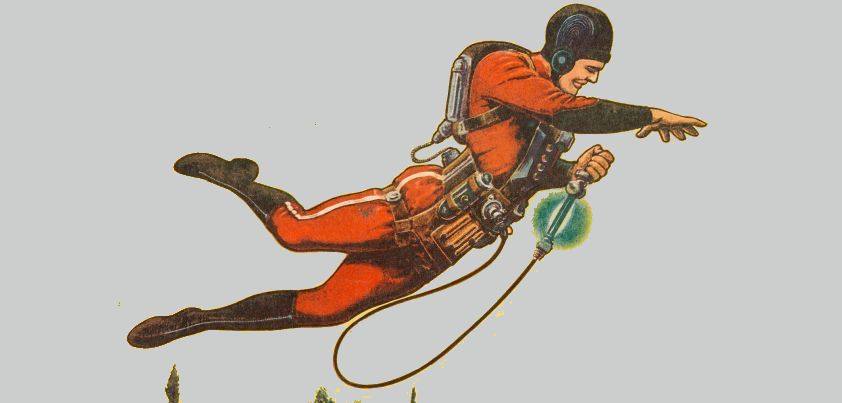 The major theme of this Science Fiction mystery by Raymond F. Jones is unlocking the hidden potential of the human mind. A government research laboratory gathers America’s leading scientists to replicate an “antigravity belt” that seemingly defies the fundamental laws of physics. The secretive young inventor died in an accident demonstrating the belt. He left no notes, and the only prototype was destroyed in the crash. To complicate matters his areas of research included not only the sciences, but also the occult with a special interest in levitation. Other themes: scientific dogmatism vs. open-mindedness, the scientific method, deception. More…
The major theme of this Science Fiction mystery by Raymond F. Jones is unlocking the hidden potential of the human mind. A government research laboratory gathers America’s leading scientists to replicate an “antigravity belt” that seemingly defies the fundamental laws of physics. The secretive young inventor died in an accident demonstrating the belt. He left no notes, and the only prototype was destroyed in the crash. To complicate matters his areas of research included not only the sciences, but also the occult with a special interest in levitation. Other themes: scientific dogmatism vs. open-mindedness, the scientific method, deception. More…
Christmas Not Just Once a Year
 This farcical comedy by Heinrich Böll can be looked at from two perspectives. The first is as a Christmas satire. After years of austere Christmases during World War II, the wife of a German businessman becomes hysterical when the tree for the traditional lavish family Christmas of 1946 is taken down. To prevent her being institutionalized, her family agree to re-celebrate Christmas Eve every day of the year. They go to ridiculous lengths to do this, destroying family unity in the process. Themes: family, tradition, mental illness, alienation, dehumanization, commercialization and loss of the spiritual meaning of Christmas, facing reality. More…
This farcical comedy by Heinrich Böll can be looked at from two perspectives. The first is as a Christmas satire. After years of austere Christmases during World War II, the wife of a German businessman becomes hysterical when the tree for the traditional lavish family Christmas of 1946 is taken down. To prevent her being institutionalized, her family agree to re-celebrate Christmas Eve every day of the year. They go to ridiculous lengths to do this, destroying family unity in the process. Themes: family, tradition, mental illness, alienation, dehumanization, commercialization and loss of the spiritual meaning of Christmas, facing reality. More…
The Birds
 This 1952 horror story by Daphne du Maurier follows a family who, along with all of Britain, come under sustained attacks by flocks of crazed birds. Seen as an analogy of the terror caused by World War Two blitz bombing and concerns about the developing Cold War, the story carries even more ominous implications for today. Consider the suggestion that climate change (shifts in the Arctic air stream) may have upset the natural order, and the death and worldwide disorder a small virus (Covid) recently caused. Themes: the vulnerability of mankind to war/natural forces, human/government complacence/ineptitiude, isolation, family, survival, self-reliance. More…
This 1952 horror story by Daphne du Maurier follows a family who, along with all of Britain, come under sustained attacks by flocks of crazed birds. Seen as an analogy of the terror caused by World War Two blitz bombing and concerns about the developing Cold War, the story carries even more ominous implications for today. Consider the suggestion that climate change (shifts in the Arctic air stream) may have upset the natural order, and the death and worldwide disorder a small virus (Covid) recently caused. Themes: the vulnerability of mankind to war/natural forces, human/government complacence/ineptitiude, isolation, family, survival, self-reliance. More…
Ringing the Changes
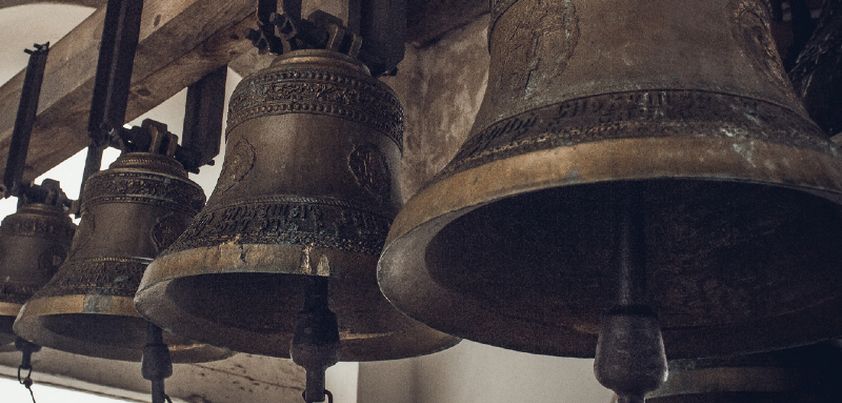 This story by Robert Aickman describes the frightening first night of a delayed honeymoon. The bride, much younger than the groom, wanted to spend their time in a remote coastal village neither had visited before. The moment they arrive, a church bell starts ringing continuously. It is out of tourist season, the streets are empty, the hotel staff act strangely, and there is a sickening, rotten smell in the air. Later, the bells of every church in the village begin ringing with urgency, heralding a macabre annual festival involving the walking dead. Themes: marriage, insecurity, isolation, class, fear, the supernatural. More…
This story by Robert Aickman describes the frightening first night of a delayed honeymoon. The bride, much younger than the groom, wanted to spend their time in a remote coastal village neither had visited before. The moment they arrive, a church bell starts ringing continuously. It is out of tourist season, the streets are empty, the hotel staff act strangely, and there is a sickening, rotten smell in the air. Later, the bells of every church in the village begin ringing with urgency, heralding a macabre annual festival involving the walking dead. Themes: marriage, insecurity, isolation, class, fear, the supernatural. More…
The Ghost of Michael Jackson
 This story by Ngugi wa Thiong’o satirizes attempts to instill Western & Eastern religious values in post-colonial Kenya. In the process, it lampoons some widely documented scandals of the modern church and the growth of contemporary megachurches with fallen celebrity pastors. A charismatic parish priest flees when a psychic boy reveals some of his vices. His loving flock are so upset by the disappearance that they overlook the boy’s revelations and are overjoyed when the priest mysteriously reappears in the form of a resurrected Michael Jackson. Themes: childhood innocence, the supernatural, superstition, culture clash, religious rivalry, zealotry, hypocrisy. More…
This story by Ngugi wa Thiong’o satirizes attempts to instill Western & Eastern religious values in post-colonial Kenya. In the process, it lampoons some widely documented scandals of the modern church and the growth of contemporary megachurches with fallen celebrity pastors. A charismatic parish priest flees when a psychic boy reveals some of his vices. His loving flock are so upset by the disappearance that they overlook the boy’s revelations and are overjoyed when the priest mysteriously reappears in the form of a resurrected Michael Jackson. Themes: childhood innocence, the supernatural, superstition, culture clash, religious rivalry, zealotry, hypocrisy. More…
Window
 This award-winning story is a wonderful example of Deborah Eisenberg’s unusual writing style. Starting and ending at the same place, the back-story is provided in disjointed fragments that generate a sense of increasing menace as the full picture emerges. A directionless, insecure eighteen-year-old leaves an unfulfilling waitress job to live in an idyllic, off-the-grid cabin with a seemingly perfect man and his infant son. She flees several months later after a brutal beating, leaving readers to ponder the reasons for and wisdom of her abduction of his child. Themes: family, friendship, loneliness, isolation, fear, quest for fulfillment. More…
This award-winning story is a wonderful example of Deborah Eisenberg’s unusual writing style. Starting and ending at the same place, the back-story is provided in disjointed fragments that generate a sense of increasing menace as the full picture emerges. A directionless, insecure eighteen-year-old leaves an unfulfilling waitress job to live in an idyllic, off-the-grid cabin with a seemingly perfect man and his infant son. She flees several months later after a brutal beating, leaving readers to ponder the reasons for and wisdom of her abduction of his child. Themes: family, friendship, loneliness, isolation, fear, quest for fulfillment. More…
The Fall of Edward Barnard
 Although ostensibly themed around a clash of cultures (East vs. West), this story from W. Somerset Maugham is also about alternative lifestyles (materialistic vs. minimalist). Through extensive use of irony, the story contrasts the lust for money, power and status of American industrialists and socialites with the Tahitian way of living in harmony with nature. In presenting the contrast, the story implies that although the environment a person grows up in shapes their values and beliefs, a change of surroundings can drastically alter them. Other themes: friendship, loyalty, romance, pride, racism. More…
Although ostensibly themed around a clash of cultures (East vs. West), this story from W. Somerset Maugham is also about alternative lifestyles (materialistic vs. minimalist). Through extensive use of irony, the story contrasts the lust for money, power and status of American industrialists and socialites with the Tahitian way of living in harmony with nature. In presenting the contrast, the story implies that although the environment a person grows up in shapes their values and beliefs, a change of surroundings can drastically alter them. Other themes: friendship, loyalty, romance, pride, racism. More…
The Short Happy Life of Francis Macomber
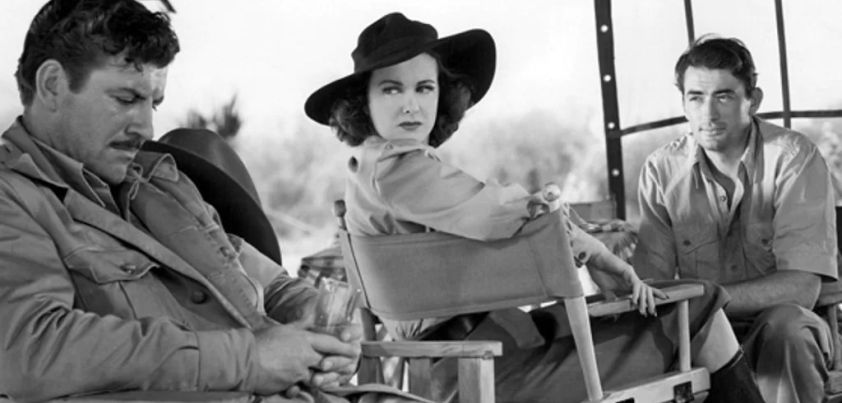 Author Ernest Hemingway goes to great lengths to set up an ambiguous ending to this story about a rich American couple’s fateful big game hunting safari in Africa. No longer (and perhaps never) in love, the couple barely tolerate each other. She can’t afford to divorce him, and he is unlikely to find a more attractive trophy wife. Readers are left to consider whether Francis’s death was murder or an unfortunate accident. What do you think? The major themes are clearly courage and masculinity. Other themes: fear; shame; violence; marriage breakdown; beauty & aging; adultery; misogyny & female stereotyping. More…
Author Ernest Hemingway goes to great lengths to set up an ambiguous ending to this story about a rich American couple’s fateful big game hunting safari in Africa. No longer (and perhaps never) in love, the couple barely tolerate each other. She can’t afford to divorce him, and he is unlikely to find a more attractive trophy wife. Readers are left to consider whether Francis’s death was murder or an unfortunate accident. What do you think? The major themes are clearly courage and masculinity. Other themes: fear; shame; violence; marriage breakdown; beauty & aging; adultery; misogyny & female stereotyping. More…
The Dream of a Ridiculous Man
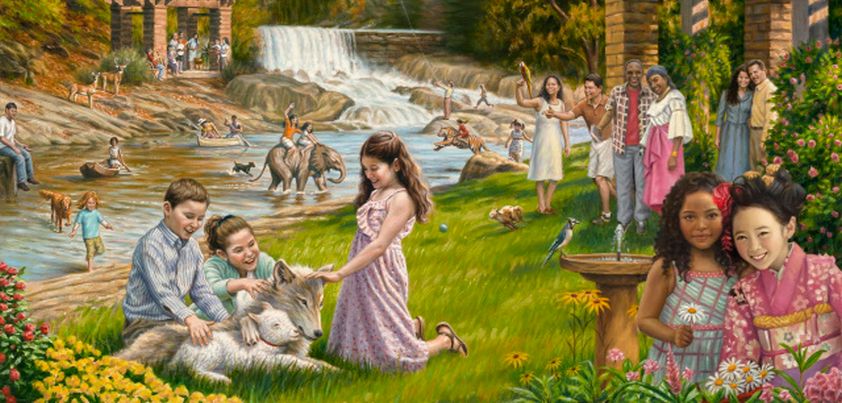 Fyodor Dostoevsky’s thought-provoking story of a man who thinks he and his life are so ridiculous as to not be worth living packs a powerful message. Having decided to commit suicide, his life is turned around by a chance encounter with a young girl asking for help on the street, and a dreamed journey to a utopian world. He learns that meaning and happiness come through suffering and love (kindness), and that indifference (lack of concern for others) can destroy them. Themes: nihilism, despair, suffering, compassion, meaning in life. More…
Fyodor Dostoevsky’s thought-provoking story of a man who thinks he and his life are so ridiculous as to not be worth living packs a powerful message. Having decided to commit suicide, his life is turned around by a chance encounter with a young girl asking for help on the street, and a dreamed journey to a utopian world. He learns that meaning and happiness come through suffering and love (kindness), and that indifference (lack of concern for others) can destroy them. Themes: nihilism, despair, suffering, compassion, meaning in life. More…
Disorder and Early Sorrow
 The charm of this story by Thomas Mann lies in its relative uneventfulness… no crime, violence, madness or broken hearts! Set in the 1920s, it follows a day in the life of a close, middle-class German family. The major theme is resilience: the struggle of the German people to recover from the social disruption and deprivations of World War I and cope with emerging hyperinflation. Secondary themes are identity, the relationship between history and the present, and the emergence of a more independent youth culture embracing new styles in music, dance, fashion and the arts. More…
The charm of this story by Thomas Mann lies in its relative uneventfulness… no crime, violence, madness or broken hearts! Set in the 1920s, it follows a day in the life of a close, middle-class German family. The major theme is resilience: the struggle of the German people to recover from the social disruption and deprivations of World War I and cope with emerging hyperinflation. Secondary themes are identity, the relationship between history and the present, and the emergence of a more independent youth culture embracing new styles in music, dance, fashion and the arts. More…
You’re Ugly, Too
 Lorrie Moore’s protagonist Zoë is a small-town college professor. She is a free-spirited, “almost pretty”, emotionally troubled woman whose efforts to forge relationships without being a “Heidi” have achieved the opposite. Her witty, cynical one-liners have alienated colleagues, students and suitors alike. Central themes are loneliness, the expectations of men, and the role of sex in relationships. An offensive, misogynistic “big city” blind date confirms her misgivings about marriage; a medical scare and consequent thoughts of death bring into focus what she sees as the futility of her life. Other themes: isolation, alienation, appearance, gender roles, mortality, nihilism. More…
Lorrie Moore’s protagonist Zoë is a small-town college professor. She is a free-spirited, “almost pretty”, emotionally troubled woman whose efforts to forge relationships without being a “Heidi” have achieved the opposite. Her witty, cynical one-liners have alienated colleagues, students and suitors alike. Central themes are loneliness, the expectations of men, and the role of sex in relationships. An offensive, misogynistic “big city” blind date confirms her misgivings about marriage; a medical scare and consequent thoughts of death bring into focus what she sees as the futility of her life. Other themes: isolation, alienation, appearance, gender roles, mortality, nihilism. More…
The Bloody Chamber
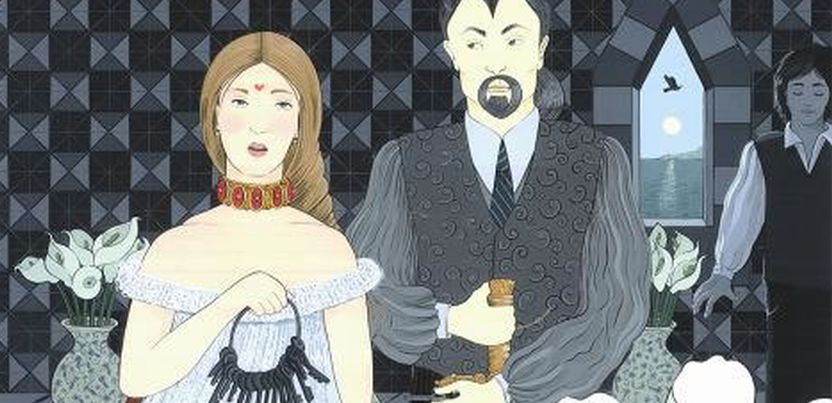 In Angela Carter’s titillating re-telling of Charles Perrault’s Bluebeard, a wealthy, three-times widowed French nobleman marries a seventeen-year-old virtuoso pianist and rushes her away to his secluded castle for a “honeymoon”. When browsing the library, she is shocked to discover his penchant for sadistic pornography. After a passionless consummation that satisfies his desire to have married a virgin, he lays a deadly trap designed to end the marriage. While he is away on business, the woman’s dark newborn curiosity springs the trap, which leads her into his bloody chamber. Themes: manipulation, sexual awakening, depravity, loneliness, curiosity, violence, death. More…
In Angela Carter’s titillating re-telling of Charles Perrault’s Bluebeard, a wealthy, three-times widowed French nobleman marries a seventeen-year-old virtuoso pianist and rushes her away to his secluded castle for a “honeymoon”. When browsing the library, she is shocked to discover his penchant for sadistic pornography. After a passionless consummation that satisfies his desire to have married a virgin, he lays a deadly trap designed to end the marriage. While he is away on business, the woman’s dark newborn curiosity springs the trap, which leads her into his bloody chamber. Themes: manipulation, sexual awakening, depravity, loneliness, curiosity, violence, death. More…
To Room Nineteen
 On the surface, Doris Lessing’s protagonist had a perfect life. “Happily” married, financially secure, big house, healthy well-adjusted children, home help; what more could a woman want? The story is a product of its time (the early 1960s). Susan’s anguish about losing her independence and lack of fulfillment in life leads to depression, mental decline, and temporary escape from her demons in Room 19 of a seedy hotel. Too afraid of being ridiculed to confide in her husband and ask for help, she sees only one way out. Themes include loss of autonomy/identity, unsatisfying marriage, depression, communication breakdown, isolation, suicide. More…
On the surface, Doris Lessing’s protagonist had a perfect life. “Happily” married, financially secure, big house, healthy well-adjusted children, home help; what more could a woman want? The story is a product of its time (the early 1960s). Susan’s anguish about losing her independence and lack of fulfillment in life leads to depression, mental decline, and temporary escape from her demons in Room 19 of a seedy hotel. Too afraid of being ridiculed to confide in her husband and ask for help, she sees only one way out. Themes include loss of autonomy/identity, unsatisfying marriage, depression, communication breakdown, isolation, suicide. More…
Letter From an Unknown Woman
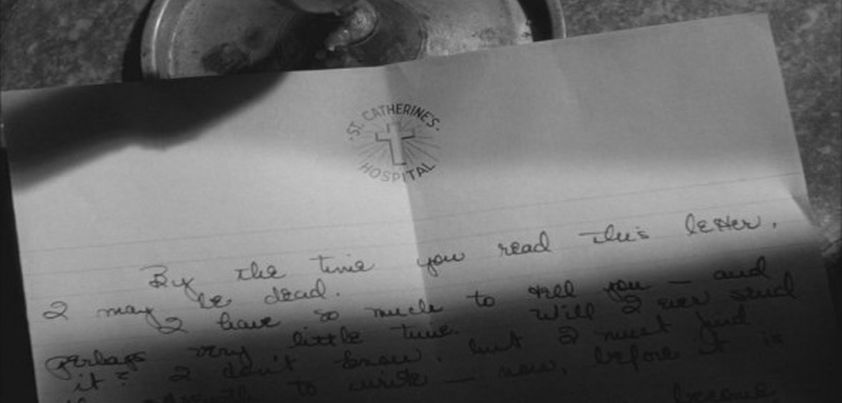 In this moving story by Stefan Zweig, a playboy writer receives a letter from a lovesick, dying woman. She has worshipped him all her life, they have had two brief dalliances, and she has borne his son. Yet he has no idea who she is! Until their son was born, he was the sole focus of her life; for him, she didn’t exist. Readers are left with a question. If she loved him so much, why send a letter that may haunt him for the rest of his days? Themes: philandering, obsessive love, sacrifice, passion, suffering, confession, death. More…
In this moving story by Stefan Zweig, a playboy writer receives a letter from a lovesick, dying woman. She has worshipped him all her life, they have had two brief dalliances, and she has borne his son. Yet he has no idea who she is! Until their son was born, he was the sole focus of her life; for him, she didn’t exist. Readers are left with a question. If she loved him so much, why send a letter that may haunt him for the rest of his days? Themes: philandering, obsessive love, sacrifice, passion, suffering, confession, death. More…
Youth
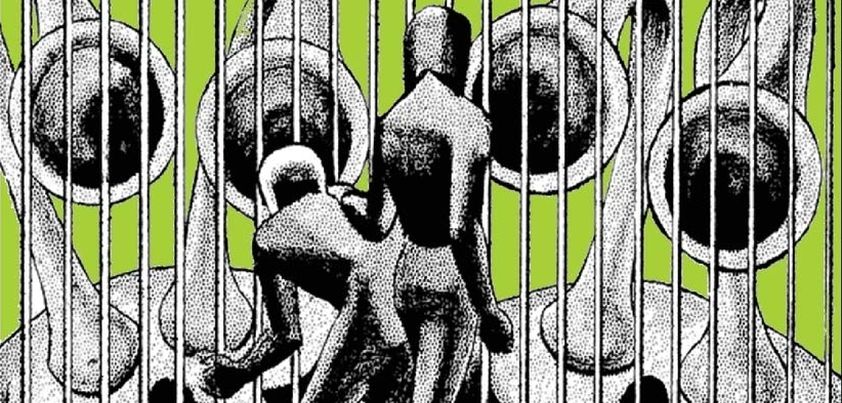 As is often the case with Isaac Asimov’s longer science fiction stories, Youth includes some profound “earthly” themes. Written in the early years of the Cold War, the first is the danger that atomic war poses to civilization. The second, which is strongly reinforced by the twist ending, is not to judge sentient beings (people) by their looks, no matter how strange they appear. A final theme, as reflected in the title and the Astronomer’s exasperated final exclamation (Youth!) is the naïve innocence of the young, and the responsibility that we as adults hold for their future. More…
As is often the case with Isaac Asimov’s longer science fiction stories, Youth includes some profound “earthly” themes. Written in the early years of the Cold War, the first is the danger that atomic war poses to civilization. The second, which is strongly reinforced by the twist ending, is not to judge sentient beings (people) by their looks, no matter how strange they appear. A final theme, as reflected in the title and the Astronomer’s exasperated final exclamation (Youth!) is the naïve innocence of the young, and the responsibility that we as adults hold for their future. More…
The Hell Screen
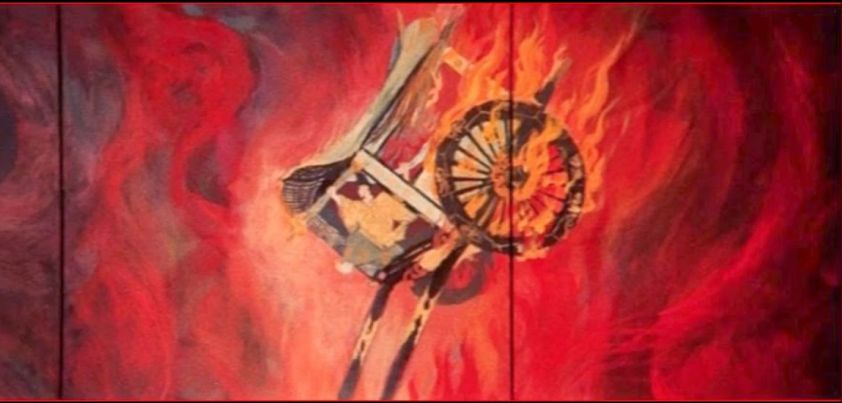 In Ryūnosuke Akutagawa‘s re-working of this 13th century Japanese tale, a cold-hearted, conceited artist considered to be “the greatest in the land” insists upon personally experiencing the scenes he creates. When commissioned to paint a folding screen with a scene from Hell, he is able to complete all but the central image of a beautiful woman burning alive in a nobleman’s carriage. He asks for help from his Feudal Lord, who agrees to stage the event for him. As the artist watches, his emotions range from horror to ecstasy. Themes: hubris, inhumanity, obsession, inspiration in art, innocence, perception of truth. More…
In Ryūnosuke Akutagawa‘s re-working of this 13th century Japanese tale, a cold-hearted, conceited artist considered to be “the greatest in the land” insists upon personally experiencing the scenes he creates. When commissioned to paint a folding screen with a scene from Hell, he is able to complete all but the central image of a beautiful woman burning alive in a nobleman’s carriage. He asks for help from his Feudal Lord, who agrees to stage the event for him. As the artist watches, his emotions range from horror to ecstasy. Themes: hubris, inhumanity, obsession, inspiration in art, innocence, perception of truth. More…
A Silver Dish
 The central theme of this thought-provoking story from Saul Bellow is protagonist Woody’s relationships with his extended family. Although much of his week is spent fulfilling the sense of duty he feels towards them, he also makes time for carnal and other pleasures. A turning point in Woody’s youth was his con-man father (Morris)’s theft of a silver dish. Despite their differences, father and son remained close and Morris’s death affects Woody greatly. In the heart-warming denouement, he proclaims his love by climbing into the dying man’s hospital bed. Other themes: ethnic/religious allegiances, pretentiousness, humiliation, aging, death, duty, self-indulgence, solitude. More…
The central theme of this thought-provoking story from Saul Bellow is protagonist Woody’s relationships with his extended family. Although much of his week is spent fulfilling the sense of duty he feels towards them, he also makes time for carnal and other pleasures. A turning point in Woody’s youth was his con-man father (Morris)’s theft of a silver dish. Despite their differences, father and son remained close and Morris’s death affects Woody greatly. In the heart-warming denouement, he proclaims his love by climbing into the dying man’s hospital bed. Other themes: ethnic/religious allegiances, pretentiousness, humiliation, aging, death, duty, self-indulgence, solitude. More…
Lord Arthur Savile’s Crime
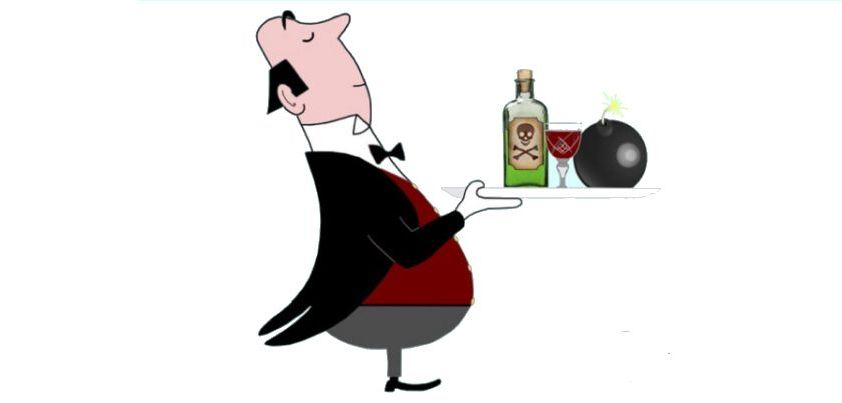 This dark comedy from Oscar Wilde involves a gullible young aristocrat who believes a palm-reader’s prediction that he will commit a murder. Out of consideration for his fiancé, he decides that he should postpone their marriage until he can get the deed out of the way. Convinced that he is merely fulfilling his destiny, the young man feels no guilt in planning and preparing for murder, or indeed remorse afterwards. When he later learns that the palm-reader was a charlatan, he still has no regrets. Themes: the shallowness and hypocrisy of the Victorian upper class, destiny, murder, morals, karma. More…
This dark comedy from Oscar Wilde involves a gullible young aristocrat who believes a palm-reader’s prediction that he will commit a murder. Out of consideration for his fiancé, he decides that he should postpone their marriage until he can get the deed out of the way. Convinced that he is merely fulfilling his destiny, the young man feels no guilt in planning and preparing for murder, or indeed remorse afterwards. When he later learns that the palm-reader was a charlatan, he still has no regrets. Themes: the shallowness and hypocrisy of the Victorian upper class, destiny, murder, morals, karma. More…
Great Day
 David Malouf’s Great Day takes place over the seventy-second birthday celebration for the patriarch of a large, close-knit Australian family. The story explores some of the differences and tensions between family members, as well as the state of mind of the patriarch. A powerful retired senior public servant with a commanding personality, he is consumed by thoughts of death. Two linked events, the destruction of a family museum and the subsequent moving words of a usually shy, tongue-tied family member bring a sense of peace to the old man and unification to the family. Themes: power, loss, dreams, connection, unification. More…
David Malouf’s Great Day takes place over the seventy-second birthday celebration for the patriarch of a large, close-knit Australian family. The story explores some of the differences and tensions between family members, as well as the state of mind of the patriarch. A powerful retired senior public servant with a commanding personality, he is consumed by thoughts of death. Two linked events, the destruction of a family museum and the subsequent moving words of a usually shy, tongue-tied family member bring a sense of peace to the old man and unification to the family. Themes: power, loss, dreams, connection, unification. More…
The Encyclopedia of the Dead
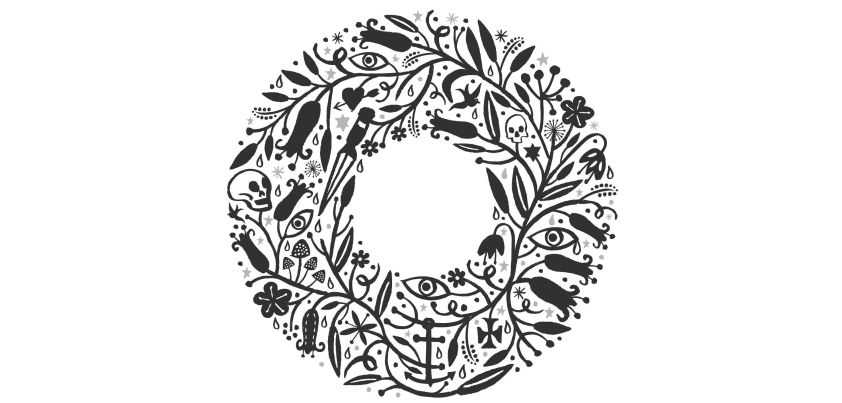 The legendary Encyclopedia in this story by Danilo Kiš records minute details of the lives of all people not famous enough to have a published biography. Readers encounter two sets of themes: those related to the book, and those arising from the protagonist’s dream about her father’s entry in the book. For the book we have egalitarianism (equality in eternity), individuality (each person is a star unto himself) and singularity (nothing in the history of mankind is ever repeated). For the protagonist’s dream, which ends with a supernatural twist, we have memories, love, aging, and coming to terms with death. More…
The legendary Encyclopedia in this story by Danilo Kiš records minute details of the lives of all people not famous enough to have a published biography. Readers encounter two sets of themes: those related to the book, and those arising from the protagonist’s dream about her father’s entry in the book. For the book we have egalitarianism (equality in eternity), individuality (each person is a star unto himself) and singularity (nothing in the history of mankind is ever repeated). For the protagonist’s dream, which ends with a supernatural twist, we have memories, love, aging, and coming to terms with death. More…
The Offshore Pirate
 Several F. Scott Fitzgerald stories feature spoiled young women from wealthy families who make a sport of manipulating the men around them. Ardita, the flapper protagonist in this romantic adventure, is one of the rudest, most obnoxious of these. A highlight of the story is Fitzgerald’s powerful descriptive language. A disturbing feature for today’s readers is the use of 1920s social and racial slurs in building Curtis Carlyle’s backstory. Major themes include wealth, egotism, rebellion against authority, escapism, racism and class-consciousness. Despite the closing “illustrative” kiss, one wonders if any relationship with Ardita could have a happily ever after ending. More…
Several F. Scott Fitzgerald stories feature spoiled young women from wealthy families who make a sport of manipulating the men around them. Ardita, the flapper protagonist in this romantic adventure, is one of the rudest, most obnoxious of these. A highlight of the story is Fitzgerald’s powerful descriptive language. A disturbing feature for today’s readers is the use of 1920s social and racial slurs in building Curtis Carlyle’s backstory. Major themes include wealth, egotism, rebellion against authority, escapism, racism and class-consciousness. Despite the closing “illustrative” kiss, one wonders if any relationship with Ardita could have a happily ever after ending. More…
Elbow Room
 This metafictional story by James Alan McPherson is an account by an unidentified black writer of his relationship with a young multiracial couple in the late 1960s. Interspersed with the narrative are questions and observations from either his editor or himself. The intense husband struggles with his identity (both his “whiteness” and place in the world). His protective black wife, who has travelled extensively with the Peace Corps, is comfortable in hers. While the parents on both sides initially opposed the union, a baby brings them onside. Themes include race and racism, loss of innocence, identity and self-awareness, storytelling. More…
This metafictional story by James Alan McPherson is an account by an unidentified black writer of his relationship with a young multiracial couple in the late 1960s. Interspersed with the narrative are questions and observations from either his editor or himself. The intense husband struggles with his identity (both his “whiteness” and place in the world). His protective black wife, who has travelled extensively with the Peace Corps, is comfortable in hers. While the parents on both sides initially opposed the union, a baby brings them onside. Themes include race and racism, loss of innocence, identity and self-awareness, storytelling. More…
The Machine Stops
 This Science Fiction classic by E. M. Forster explores the role of “the machine” in the rise and fall of a future dystopian civilization. After developing the machine the population grow dependent upon it, become controlled by it, worship it, and are ultimately destroyed by it. In the process, they regress in terms of human interaction, family relationships, physical strength, critical thinking ability and free will. Only the “homeless”, who have no access to the machine, survive. The major theme is the danger of over-reliance on and losing control of technology. Other themes: environmental degradation, religious faith, freedom, rebellion. More…
This Science Fiction classic by E. M. Forster explores the role of “the machine” in the rise and fall of a future dystopian civilization. After developing the machine the population grow dependent upon it, become controlled by it, worship it, and are ultimately destroyed by it. In the process, they regress in terms of human interaction, family relationships, physical strength, critical thinking ability and free will. Only the “homeless”, who have no access to the machine, survive. The major theme is the danger of over-reliance on and losing control of technology. Other themes: environmental degradation, religious faith, freedom, rebellion. More…